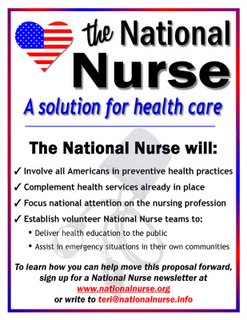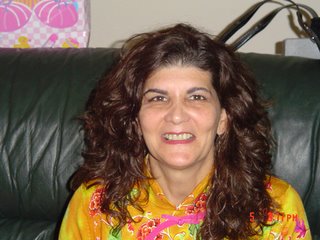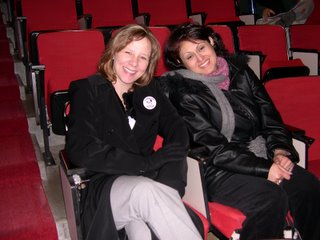The sour classmate (see previous post) has taken a turn for the friendly.
This only reinforces my belief in the value of kindness toward one's enemies. Refusing to meet a challenge with an equal challenge isn't selling out. Some people might mistake a lack of confrontation or self-defense as weakness. But it is not. It is only a more stealthy way of tending one's relationships.
I liken it to slipping a medicine into someone's oatmeal. Slowly the disease is destroyed from the inside out. Maybe it doesn't work every time. Maybe you need to try a few different treatments. Or maybe the disease can't be cured. But more often than not, that person you cared for will realize they can't remember why they dislike you anymore.
Sometimes yin conquers yang, if you understand what I mean.
In other news, I started my first IV today. I was totally jazzed about it all morning. And last Monday my group made one hell of a presentation. Beyond that, it's business as usual.
I'm ever the optimist.
Rabu, 29 Maret 2006
Congressman David Wu (OR) To Co-Sponsor HR 4903
 (Pictured: Congressman David Wu)
(Pictured: Congressman David Wu)Although the Thomas website is slow in updating the latest list of co-sponsors to HR 4903, the National Nurse Act of 2006, the National Nurse Team is pleased to announce that Congressman David Wu from Oregon is signing on to the bill. Two members of the Team met with Congressman Wu's staff last summer. The Team wishes to thank Congressman Wu and his staff for positively acknowledging the importance of the critical role nurses play in our nation's health care system.
Here is Congressman Wu's statement:
"Currently there are at least 100,000 vacant nursing positions in long-term care facilities and, predictions are that over the next 20 years our nation will be short as many as 400,000 nurses if nothing is done to change current trends. Clearly, we must do all we can to encourage individuals to enter the nursing profession," stated Congressman David Wu. "H.R. 4903, the National Nurse Act of 2006, would provide a good start to addressing the nursing shortage by coordinating education and community outreach efforts on a national level."
Statement From Representative Peter DeFazio (OR)
 (Pictured: Representative Peter DeFazio)
(Pictured: Representative Peter DeFazio)On behalf of the National Nurse Campaign, we thank Representative Peter DeFazio from Oregon for joining the growing list of co-sponsors to HR 4903, The National Nurse Act of 2006.
Here is Congressman DeFazio's statement:
It is long overdue that the U.S. have a national nurse to stand alongside the surgeon general. Nurses have long played an essential role in America's health care system. A national nurse is someone who can help spread the word about health services, who can provide preventive health advice, and who can encourage others to get involved in the profession of nursing.
Selasa, 28 Maret 2006
Illinois Nurse Sends Us This Tip For Wellness
 (Pictured: Anne Nowlin)
(Pictured: Anne Nowlin)BLOOD PRESSURE GUIDELINES recommend keeping blood pressure at or below 120/80. The amount of salt in our diets affects our blood pressure. The more salt we eat, the higher our blood pressure and the greater our risk for heart disease, leading to stroke and heart attacks. One way to keep blood pressure at or below 120/80 is by limiting salt intake; fast food, prepackaged foods and decreasing the amount of table salt in our diets.
Anne Nowlin BSN, RN, Illinois
Citations:
Seventh Report of the Joint National Committee on Prevention, Detection, Evaluation, and Treatment of High Blood Pressure
(JNC 7), NIH publication 04-5230, from the National Heart, Lung and Blood Institute
Chobanin et al, The Seventh Report of the Joint National Committee on Prevention, Detection, Evaluation, and Treatment of High Blood Pressure, Hypertension, 42 (6): 1206 (2003)
Sabtu, 25 Maret 2006
Learn More About HR 4903-The National Nurse Act of 2006

The What Is Next Speaker Series at Mt Wachusett Community College located in Gardner, Massachusetts continues Friday, March 31 with the appearance of two advocates for an Office of the National Nurse. Starting at 10 a.m. in the Fine Arts Theater, nurses Teri Mills and Alisa Schneider will make their case for the creation of this new position in the federal government. The free event is co-sponsored by MWCC, the Molly Bish Institute for Child Health and Safety and the Deans of Health Programs in Massachusetts Community Colleges. For more information, or to register, contact Gayle Jaillet at (978) 630-9265 or gjaillet@mwcc.mass.edu.
Jumat, 24 Maret 2006
Deep Vein Thrombosis (DVT) Awareness
 (Pictured: Victoria Hawkins DrPh, RN)
(Pictured: Victoria Hawkins DrPh, RN)Every year nearly one million people in the US develop deep vein thrombosis or DVT (blood clot in a vein) and almost one-third of these cases end in death from complications. (1)
Conditions that can put you at risk for DVT include long-distance air travel, hospitalization for 72 hours or more, pneumonia, advanced age, obesity, varicose veins, hormone therapy, and cancer, as well as a history of previous DVT, stroke, heart failure, emphysema, or inherited conditions that predispose to clots.
The good news is that DVT is preventable. For more information visit Prevent DVT .
(1) Heit JA, Cohen AT. Anderson FA et al on behalf of the VTE Impact Assessment Group. Estimated annual number of incident and recurrent, non-fatal and fatal venous thromboembolism (VTE) events in the US. Poster 68 presented at: American Society of Hematology, 47th Annual Meeting, Atlanta, GA, December 10-13, 2005.
Submitted by:
Victoria Hawkins, DrPH, RN
Practice Outcomes Nurse Specialist
University of Texas M.D. Anderson Cancer Center
Rabu, 22 Maret 2006
Thank You Representative Dale Kildee (MI)
 (Pictured: Representative Dale Kildee (MI)
(Pictured: Representative Dale Kildee (MI)The Honorable Dale Kildee, representing the 5th Congressional District of Michigan, was one of the first to sign on as a co-sponsor of HR 4903, the National Nurse Act of 2006.
Representative Kildee states, "Nurses are vital to providing and maintaining high quality, affordable health care. Increasingly, nurses are the first health care professional patients will see, often providing direct care, explaining diagnoses, preventive measures and treatment methods. An Office of the National Nurse will be a strong, visible advocate for national health priorities and will emphasize the need to recruit and retain nurses to meet the growing demand for care."
The National Nurse Team extends their gratitude to Representative Kildee and his staff for their support.
Writing Your U.S. Representatives

Through the help of a supporter in Woodburn, Oregon and another in Arizona, the National Nurse Team now has images that you can upload on your computer to make postcards that you can mail to your Representative. These can be ordered through Vista Print for a reasonable price.
If you would like to receive the PDF image files for these postcards, please email teri@nationalnurse.info. Don't have a computer, but would be interested in having some postcards mailed to you, let us know.
The Representatives need to hear from the people and hearing from a group of their own constituents is both powerful and convincing.
Senin, 20 Maret 2006
Getting The Word Out

(Pictured Lillian Gonzalez, Teri Mills, Alisa Schneider)
One of the National Nurse Team's goals is to educate as many nurses and nursing students as possible about the National Nurse Act of 2006. Lillian Gonzalez will be presenting to a Nevada Chapter of the Student Nurses Association, and Teri and Alisa are heading to Mt. Wachusett Community College next week.
Please call your Representative, tell them you are a constituent supporting HR 4903 and you would like them to co-sponsor this important piece of legislation.
Tell your Representative that a National Nurse focused on mobilizing American nurses throughout the country to educate Americans about wellness makes sense. Here are just a few reasons:
1.The education of nurses focuses on disease prevention and health promotion.
2. With 2.9 million registered nurses in the U.S., nurses comprise the largest sector of healthcare workers in the nation.
3. Public polls rank nurses number one for trust and ethics.
4. As expert healthcare teachers, nurses have vast experience translating technical jargon.
5. Nurses understand the need to involve other healthcare disciplines to ensure positive outcomes for patients.
Remember, you can click on the picture of the capitol to learn who your Representative is along with their contact information. Make the calls today and let's work together to move the bill towards a Committee Hearing. Nursing is about teamwork and this is no different.
Jumat, 17 Maret 2006
MedPage Today : a clearinghouse of new and compelling medical news info
http://www.medpagetoday.com Check it out!! (Not specifically nursing related but a great new resource)
Developed by The University of Pennsylvania School of Medicine and a team of
administrators and physicians, MedPage Today is a clearinghouse of new and
compelling medical news information. Along with these accessible and well-
written updates, the site also includes "Teaching Brief" articles which help
clinicians and consumers to understand the implications of these new
discoveries and developments in the medical world. From the left-side of the
homepage, visitors can peruse the latest news updates by specialty,
including psychiatry, nephrology, pediatrics, and others. Visitors who find
that they return to the site frequently may also want to sign up to receive
email updates every morning in their inbox. Overall, the site will be of
interest to medical practitioners as well as the lay public
Developed by The University of Pennsylvania School of Medicine and a team of
administrators and physicians, MedPage Today is a clearinghouse of new and
compelling medical news information. Along with these accessible and well-
written updates, the site also includes "Teaching Brief" articles which help
clinicians and consumers to understand the implications of these new
discoveries and developments in the medical world. From the left-side of the
homepage, visitors can peruse the latest news updates by specialty,
including psychiatry, nephrology, pediatrics, and others. Visitors who find
that they return to the site frequently may also want to sign up to receive
email updates every morning in their inbox. Overall, the site will be of
interest to medical practitioners as well as the lay public
Kamis, 16 Maret 2006
Health Suggestion To Keep Americans Well
 (Pictured: Jane Jeffrie Seley)
(Pictured: Jane Jeffrie Seley)A few weeks ago, one of our supporters from Oregon recommended we start modeling what the Office of the National Nurse would do to help keep Americans healthy. Nurses have begun to send us their health tips, and here is one from a nurse from New York, Jane Jeffrie Seley. Jane recently was interviewed by the New York Times for their four part series on type 2 diabetes. Jane's tip demonstrates the type of expertise that the Office of the National Nurse will capture and disseminate to the country. Thank you Jane.
The Diabetes Prevention Program showed us that people who are at high risk for developing diabetes can lower their risk by 58% with diet and exercise. 1 Many of us want to eat less and exercise more, but find it difficult to get started. A simple, effective and inexpensive plan is to wear a pedometer. The pedometer should be worn for several days with usual activity to establish a baseline of the number of steps taken per day. One can then slowly increase the number of steps with the goal of working up to 8,000 to 10,000 steps per day.
1. Knowler WC, et al, for the Diabetes Prevention Program Research Group. Reduction in the incidence of type 2 diabetes with lifestyle intervention or metformin. N Engl J Med. 2002;346:393-403
Jane Jeffrie Seley, GNP, MPH, MSN, CDE
Dianetes Nurse Practitioner
NewYork Presbyterian/Weill Cornell
New York, NY
If you have education you would like to share, please send a concise version (two or three sentences) with your reference, name, title, and state to teri@nationalnurse.info.
Rabu, 15 Maret 2006
Sour Exteriors
Wow, did I really leave that previous whiney post at the top of the blog for a whole month? I guess I've been busier than I thought. Time really does fly.
Story #1
One of my patients today had his wife in the room with him. She is a retired nurse. Ahh! The woman was Old School. Yesterday, she wanted her nurse to come in and rub lotion on her husband's body RIGHT THEN. Now, while I believe skincare is important, I can understand why the staff kinda bumped that intervention to the bottom of the list. It's a busy floor with lots of heart patients. They were trying to get a whole bunch of new people settled into their rooms and started on their various IV meds. When they told the woman she would have to wait a while before a nurse could come rub him down with topical ointments, she became a wee bit hostile. When I picked him up as one of my patients today, all the staff said "Just be READY. The woman is relentless."
Of course, my day with this patient unfolded much differently than the staff predicted. I spent a while in the room talking with the pair of them. Apparently the nurse never showed up to give the skincare yesterday. They have been bandaging him with adhesives despite doctors orders not to. (And this guy has weird skin problems; if you put a bandaid him take it off again, it will remove a large chunk of his skin. Without the ointment he peels like an onion.) Their cardiac consult never showed up yesterday. All in all, they felt neglected.
I made sure to get the man bathed, treated his skin, and got him fresh linens. I talked with the woman about her heart problems, and how they made her too weak to care for her husband. She seemed relieved that SOMEONE was talking to her. And I didn't find her the least bit hostile this time around. Okay, so maybe she was a little bossy sometimes when it came to nursing things. But hey, I'm the student. I didn't mind.
Story #2
One of my groupmates doesn't get along with the rest.
I don't really understand why this is the case. At lunchtime we all sit together and chat, but she moves off to the side and stares straight ahead, not participating. When the group makes decisions she doesn't like (such as our move from two short hospital days to one long one), she makes her displeasure known in ways I find kindof... odd. I am trying to be delicate here; I honestly don't want to start typing bad things about her because she's been short with me a few times. I have heard several other students express a real dislike for her, and tend to believe they give accurate accounts of her behavior... but my goal isn't speak ill of her as much as it is to question why this situation exists in the first place.
It is obvious that she is a smart person. And when other people she knows walk through the hospital, she greets them with a warm smile and a hug. So she obviously has friends... how did we get on her bad side? When I ask her questions, her responses are terse and somewhat aloof. The group has ceased to try engaging her in conversation, because it really feels like she doesn't want to talk to us. Is this the truth of the matter? Does she exclude herself, or are we excluding her because we think that's what she wants?
I dislike judging people by the way they behave on the surface. It would be so easy just to write her off as arrogant and petty. Yet, in my experience, people who are cold on the outside are rarely coldhearted as well. Believing otherwise is dehumanizing. (Just look at this patient's wife I took care of in the first story: the whole floor was set against the woman. I only had to spend a little time with her to uncover the reason for her anger. Once solved, she was more than pleasant to talk to.)
I have faith that my groupmate is more than she appears to be, and that under that unfriendly surface she's as nice to talk to as anyone else. It's a kind of project for me. I am determined to get this girl to speak more than two words to me at a time. She doesn't have to be my friend, but it we be nice if she would work as my ally (God knows nurses need to help each other).
People are always telling me "Heather, you can't please everyone." And man, I know that is so true. However. I also like to add that "You may not be able to please everyone, but you can usually please a lot more people than you'd expect with just a tiny bit of extra effort."
Why do I continue to give that extra effort toward hostile people? I don't know, but I think of it as a Golden Rule type thing. Maybe the person is sour to the core. Maybe he or she will end up hating me for no reason. But then again, maybe they won't. I think it's worth it. At least I can always say I really tried.
Story #1
One of my patients today had his wife in the room with him. She is a retired nurse. Ahh! The woman was Old School. Yesterday, she wanted her nurse to come in and rub lotion on her husband's body RIGHT THEN. Now, while I believe skincare is important, I can understand why the staff kinda bumped that intervention to the bottom of the list. It's a busy floor with lots of heart patients. They were trying to get a whole bunch of new people settled into their rooms and started on their various IV meds. When they told the woman she would have to wait a while before a nurse could come rub him down with topical ointments, she became a wee bit hostile. When I picked him up as one of my patients today, all the staff said "Just be READY. The woman is relentless."
Of course, my day with this patient unfolded much differently than the staff predicted. I spent a while in the room talking with the pair of them. Apparently the nurse never showed up to give the skincare yesterday. They have been bandaging him with adhesives despite doctors orders not to. (And this guy has weird skin problems; if you put a bandaid him take it off again, it will remove a large chunk of his skin. Without the ointment he peels like an onion.) Their cardiac consult never showed up yesterday. All in all, they felt neglected.
I made sure to get the man bathed, treated his skin, and got him fresh linens. I talked with the woman about her heart problems, and how they made her too weak to care for her husband. She seemed relieved that SOMEONE was talking to her. And I didn't find her the least bit hostile this time around. Okay, so maybe she was a little bossy sometimes when it came to nursing things. But hey, I'm the student. I didn't mind.
Story #2
One of my groupmates doesn't get along with the rest.
I don't really understand why this is the case. At lunchtime we all sit together and chat, but she moves off to the side and stares straight ahead, not participating. When the group makes decisions she doesn't like (such as our move from two short hospital days to one long one), she makes her displeasure known in ways I find kindof... odd. I am trying to be delicate here; I honestly don't want to start typing bad things about her because she's been short with me a few times. I have heard several other students express a real dislike for her, and tend to believe they give accurate accounts of her behavior... but my goal isn't speak ill of her as much as it is to question why this situation exists in the first place.
It is obvious that she is a smart person. And when other people she knows walk through the hospital, she greets them with a warm smile and a hug. So she obviously has friends... how did we get on her bad side? When I ask her questions, her responses are terse and somewhat aloof. The group has ceased to try engaging her in conversation, because it really feels like she doesn't want to talk to us. Is this the truth of the matter? Does she exclude herself, or are we excluding her because we think that's what she wants?
I dislike judging people by the way they behave on the surface. It would be so easy just to write her off as arrogant and petty. Yet, in my experience, people who are cold on the outside are rarely coldhearted as well. Believing otherwise is dehumanizing. (Just look at this patient's wife I took care of in the first story: the whole floor was set against the woman. I only had to spend a little time with her to uncover the reason for her anger. Once solved, she was more than pleasant to talk to.)
I have faith that my groupmate is more than she appears to be, and that under that unfriendly surface she's as nice to talk to as anyone else. It's a kind of project for me. I am determined to get this girl to speak more than two words to me at a time. She doesn't have to be my friend, but it we be nice if she would work as my ally (God knows nurses need to help each other).
People are always telling me "Heather, you can't please everyone." And man, I know that is so true. However. I also like to add that "You may not be able to please everyone, but you can usually please a lot more people than you'd expect with just a tiny bit of extra effort."
Why do I continue to give that extra effort toward hostile people? I don't know, but I think of it as a Golden Rule type thing. Maybe the person is sour to the core. Maybe he or she will end up hating me for no reason. But then again, maybe they won't. I think it's worth it. At least I can always say I really tried.
Representative Earl Blumenauer to Co-Sponsor HR 4903

(Pictured Representative Blumenauer and Teri)
The National Nurse Team wishes to express our gratitude to Rep. Earl Blumenauer (D-OR) who became the first co-sponsor of HR 4903-The National Nurse Act of 2006.
Representative Blumenauer introduced "America's Nurse", the op/ed that detailed the proposal for an Office of the National Nurse into Congressional Record on May 26, 2005 and has been instrumental in assisting the National Nurse Team.
Representative Blumenauer commends the National Nurse Team for their diligence in lobbying on the issue and says "The team is an inspiration and proof that citizens really can make a difference. Their dedication leaves me with no doubt that their idea (for an Office of the National Nurse) will eventually come to fruition and I applaud their efforts."
Kamis, 09 Maret 2006
EXCITING NEWS !!

(Pictured left: Representative Lois Capps)
The National Nurse Team is delighted to announce that the bill to establish an Office of the National Nurse has been introduced on the floor of the House of Representatives on March 8th, 2006. The bill is HR 4903 and will be available for viewing in its entirety tomorrow on www.thomas.loc.gov. We all thank Representative Lois Capps (D-CA) and her dedicated staff for introducing this bill during the second session of the 109th session of Congress.
HR 4903 establishes an Office of the National Nurse that will:
1. Involve all Americans in preventive health practices.
2. Complement health services already in place.
3. Establish volunteer national nurse teams to deliver nursing assistance and education to communities in crisis.
There is a lot of work to be done, and many ways you can help.
Contact your elected officials to ask them to support this bill.
1. Here are the telephone numbers and email addresses of your elected Representatives and Senators OR you may call these toll free numbers: 1-877-762-8762, 1-888-723-5246, 1-800-426-8073
2. View this sample letter and phone script.
3. Many of you have expressed interest in visiting your own Congressional Office in person. Tips for successful lobbying are also available.
Help the team raise funds to return to Washington DC to lobby.
1. Click on the "DONATE NOW" button located on the top left corner of the website.
2. Write a check to: National Nursing Network Organization, 20564 SW 98th Court, Tualatin, OR 97062
*** The National Nursing Network Organization is a non-profit corporation, but it is not tax-exempt and therefore, your contributions are not tax deductible.
Help spread the word.
1. Purchase a button or bumper sticker.
2. Invite us to speak at your business meetings, conferences, and conventions.
3. Contact Teri@NationalNurse.info to receive a complementary flyer to post at your workplace.
4. Contact Teri@NationalNurse.info if you are a graphic artist who is willing to donate your talents to update our merchandise.
The National Nurse Team will send out a regular information newsletter next week, including a health tip to keep you and our citizens healthy-a reader suggested this and the team thought it was a great idea to begin modeling what the Office will do.
We have a lot of exciting activities but for now, let us all give the members of Congress something to talk about. Please make your phone calls and write your letters to your elected officials today!
Teri, Alisa, and Terri
The National Nurse Team
Rabu, 01 Maret 2006
Newsletters

The National Nurse Team would like to invite you to sign up to receive our newsletters that update each of you personally about the progress we are making in moving the National Nurse proposal forward in Congress and also the efforts we are making to educate the public about this initiative. You can do this two ways. Either email teri@nationalnurse.info and request to be on our data base or submit your email in the box located on the right side of this website.
Speaking of newsletters, the National Nurse proposal was recently published by the following organizations: Oregon Student Nurses Association, Vermont Nursing Association, Utah Public Health Administration, and Minnesota Department of Public Health.
Please let us know if you are interested in having an article published in your organization's newsletter. This is a great way to clarify facts about the National Nurse proposal and encourage others to support it as well.